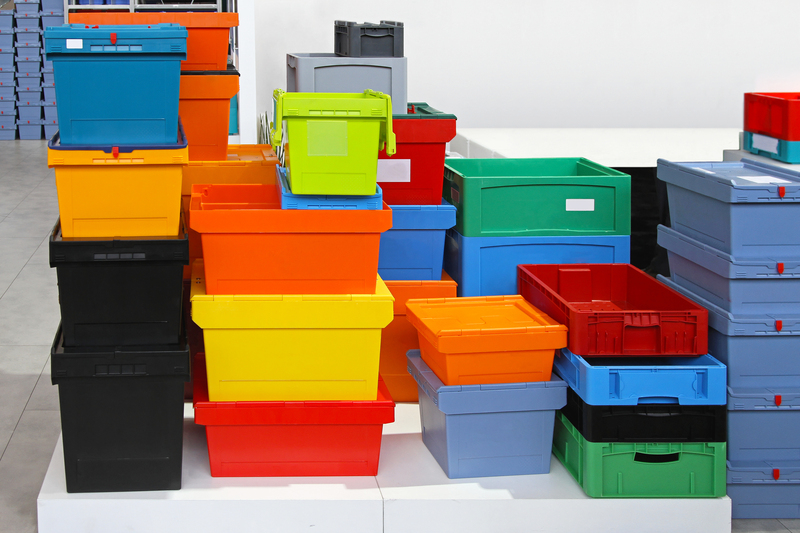Properly Storing an Unused Freezer: A Handy Guide
Posted on 17/06/2025
Properly Storing an Unused Freezer: A Handy Guide
Whether you purchased a new appliance or are making space in your home, storing a freezer that isn't in use involves more than unplugging and walking away. Properly storing an unused freezer helps maintain its longevity, keeps it ready for future use, and can prevent unpleasant odor or damage. In this comprehensive guide, you'll find out how to store a freezer that isn't needed, the best places for storage, and essential tips to ensure your appliance remains in tip-top condition.

Why Is Proper Storage Important for Your Unused Freezer?
Many people overlook the significance of properly storing household appliances, especially freezers. However, incorrect storage can lead to various issues such as mold, unpleasant smells, corrosion, and mechanical failures. Taking the right steps will ensure your freezer remains functional and odor-free when you want to use it again.
The Risks of Improper Freezer Storage
- Mold and Mildew Growth: Trapped moisture and food particles in your freezer can cause fungal growth.
- Unpleasant Odors: Uncleaned residues can create persistent bad smells.
- Rust and Corrosion: Excess moisture or humidity can corrode internal components.
- Component Damage: Neglected freezers may suffer from mechanical or electrical failures.
- Pest Intrusion: Small rodents or insects may infest a freezer not sealed or cleaned properly.
Step-by-Step Guide: How to Store a Freezer When Not in Use
If you plan to leave your freezer unused for an extended period, following correct freezer storage procedures will protect your investment and ensure quick, hassle-free future use. Here's a step-by-step guide to properly storing your unused freezer:
1. Empty the Freezer Completely
The first step to preparing a freezer for storage is to remove all food contents. Even if you plan to store the freezer for a short time, don't leave anything inside. Food left inside can spoil, attract pests, and create lingering odors that are hard to eliminate.
2. Defrost the Freezer Thoroughly
After you've emptied your freezer, unplug it. Allow enough time for all the ice to melt. Most modern freezers will self-defrost after unplugging, but it could take several hours and may require some towels to absorb the melting water.
- Place towels around the base to catch water and avoid floor damage.
- For stubborn ice, use a plastic spatula (never a metal object) to gently chip away at ice, or set a bowl of hot water inside to speed up thawing.
3. Clean the Interior and Exterior
Before storing your unused freezer, clean it thoroughly. This prevents odors, mold, and attracts fewer pests during storage.
-
Interior:
- Mix a solution of warm water and mild dish soap or use a baking soda solution (1 tablespoon baking soda to 1 quart warm water).
- Wipe all surfaces, corners, seals, and removable shelves/baskets.
- Dry completely with clean cloths.
-
Exterior:
- Wipe the outer surface with soapy water, paying attention to handles and seals.
- Dry the exterior thoroughly to prevent rust.
4. Remove and Clean Accessories
Don't forget baskets, shelves, or ice trays. Clean and dry them separately and ensure they are fully dry before placing them back in the freezer or storing them elsewhere.
5. Prevent Odors During Storage
A common issue when storing a freezer that is not used regularly is the development of odors. Keep your appliance smelling fresh by:
- Placing an open box of baking soda or activated charcoal inside.
- Consider a bowl of dry coffee grounds for a neutral scent.
Leaving the freezer door slightly ajar is also crucial. If possible, prop the door open with a rolled towel or dedicated spacer to allow airflow and prevent moisture buildup and musty smells.
6. Store the Freezer Upright
A key tip to storing an unused freezer safely is to always keep it upright. Moving or storing a freezer on its side may allow compressor oil to flow into the cooling lines, potentially damaging the appliance.
- Transport and store your freezer in its normal, upright position.
- Never lay it on its back or side unless absolutely necessary and only for short periods.
7. Choose the Right Storage Location
Where you store your unused freezer will affect its long-term condition. Ideal places are clean, dry, and climate-controlled environments. The main options include:
- Garage: Only consider if your region's temperatures remain moderate and the garage is not overly humid.
- Basement: Preferable for its temperature stability, but ensure it is dry and well-ventilated to avoid rust and mold.
- Storage Facility: Heated, climate-controlled storage units provide the safest environment for long-term freezer storage.
- Spare Room or Utility Room: Best if you can accommodate the size, as indoor temperatures are most predictable.
Tip: Avoid storing freezers outdoors or in uninsulated sheds. Extreme temperatures or humidity can severely damage appliances that are not in regular use.
8. Protect Against Dust and Dirt
While stored, dust and debris can accumulate, potentially clogging vents or damaging components. To best preserve your unused freezer:
- Cover it with a breathable cloth (such as a cotton sheet). Avoid plastic tarps because they can trap moisture against the surface.
- Check the cover periodically to make sure it remains secure and dry.
9. Secure the Power Cord
Ensure that the freezer's power cord is clean and coiled loosely. Avoid pinching or tightly winding the cord, as this can cause damage or even create a fire hazard when the freezer is eventually plugged back in.
10. Periodically Inspect the Appliance
Even while in storage, check your stored freezer occasionally for dust, pests, mold, or moisture buildup:
- Open the door and verify the interior remains dry and odor-free.
- Replace the box of baking soda or charcoal as necessary.
How Long Can You Store a Freezer Unused?
When properly storing a freezer according to the above steps, an unplugged freezer can be left unused for months or even years without significant risk. The most vital factors are ensuring the freezer stays clean, dry, and remains in a stable environment.
Before reactivating your freezer after long-term storage, inspect it thoroughly for signs of wear, moisture, or pests. Allow it to sit upright (if it was moved) for at least several hours before plugging in, to let any displaced compressor oil settle.
Frequently Asked Questions About Unused Freezer Storage
1. Can You Store a Freezer Outside?
No, it is not recommended. Temperature swings, humidity, rain, and direct sun can all wreak havoc on freezer components and lead to rust, electrical shorting, or insulation breakdown. Always choose an indoor or climate-stable location for the best results.
2. Should You Leave a Freezer Door Open When Storing?
Yes! Always prop the door open. Closing the door tightly traps any remaining moisture, encouraging mold and odors. Use a spacer or towel to leave the door slightly ajar, ensuring airflow inside the cabinet.
3. What's the Best Way to Eliminate Odors from a Stored Freezer?
Clean thoroughly before storage using a baking soda solution. Place a box of baking soda, activated charcoal, or dry coffee grounds inside throughout the storage period. Check and replace these odor absorbers periodically.
4. Is It Okay to Store a Freezer on Its Side?
It's best avoided. Only do this if you have no other choice, and minimize the time spent on its side. Before using the freezer again, set it upright for a few hours so the compressor oil can drain back to its proper place.
5. Can I Store Things Inside My Freezer During Storage?
While you should leave the freezer empty for air circulation and avoid odors, storing lightweight, non-food items such as ice packs or sealed dry goods can be safe. Never store food or moisture-producing items inside an unplugged freezer.

Key Takeaways: Storing Your Freezer for Longevity
- Clean and dry the freezer thoroughly before storage.
- Prop the door open to avoid musty odors and mold.
- Choose an indoor, dry, stable environment for storage whenever possible.
- Cover the freezer with a breathable material to protect from dust.
- Inspect periodically and address any issues, such as moisture or pests, immediately.
Conclusion: Properly Storing Your Unused Freezer
A neglected freezer can become a major hassle when it's next needed. Following the above guide will not only preserve the function and appearance of your appliance, but will also save you money, time, and frustration down the line. By paying attention to cleaning, ventilation, placement, and protection, you ensure that your unused freezer will be ready for service the next time you need it.
So, if you find yourself needing to store a freezer when not in use, reference these essential steps and give your appliance the best chance for a long, odor-free, and operational life!
Don't Forget:
- Proper freezer storage = longer appliance life and peace of mind.
- Regular inspection and maintenance is the key to avoiding surprises!
For more tips on caring for your household appliances and making the most of your home, stay tuned to our blog!
Latest Posts
A guide to sparkling clean homes before moving out
Effortless Tips for a Smooth, Stress-Free Move
Properly Storing an Unused Freezer: A Handy Guide

 request quote
request quote





